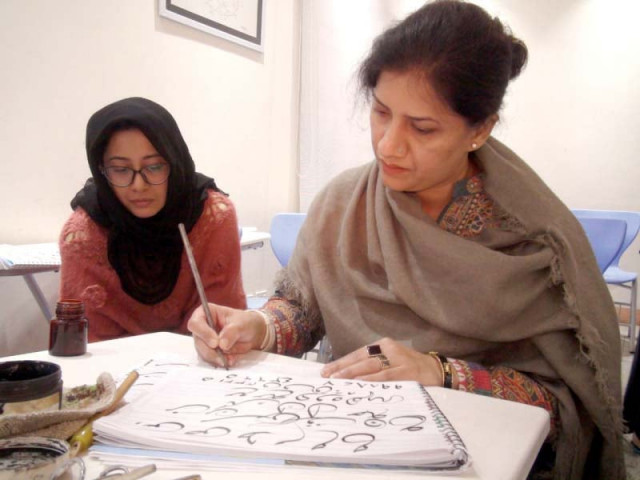Seeking perfection: A ‘spiritual’ art kept alive in Lahore
A young calligrapher joins hands with other practitioners of his craft to bring it to a new generation

PHOTO: EXPRESS
Up and coming calligrapher Akasha Mujahid, for one, sure does. The young member of the Kilani family, which has been associated with calligraphy for 300 years, is doing his best to keep the centuries-old tradition alive and kicking. Not content with pursuing the craft on a personal level, the calligrapher who has attained mastery in both English and Arabic has also set up an institute in Lahore to train others in the art of ‘developing their souls’.
“Calligraphy is the civilisational and cultural heritage of the golden age of Muslims,” Mujahid said. “Countless Muslim rulers and aristocrats spent both their blood and dime to promote this art form in their times, so much so that it became an iconic part of Islamic civilisations. Curiously enough, calligraphy’s downfall started around the same time as the decline of Muslim empires,” he added.
How this calligraphy artist finally met PM Imran
Mujahid said he was trying his best to keep his family’s calligraphy heritage alive and introduce the art to a new generation. “At my calligraphy institute, I am heartened to see younger people take a keen interest in art. Not just them, many parents are bringing their children to me so that calligraphy traditions stay alive.”
Among the students in Mujahid’s calligraphy centre are a large number of women. One of them, artist Saima, recounted some of the challenges she encountered when she took up the art. “I tried to write ‘Allah’ in calligraphy style before any other challenge and I found it immensely difficult,” she said. “It was evident to me that needed formal training so I enrolled here. It’s been six months and I have added so many words to my calligraphic repertoire.”
Another female student, Maimoona, said she had spiritual reasons for pursuing Islamic calligraphy. “It satisfies my soul. Whenever I read the Holy Quran, I have the urge to write the verses out with perfection. Learning how to do that fills my heart.”
Beyond keeping calligraphy in general relevant, Mujahid and his fellow calligraphers at his Faisal Town institute are also working to gain international recognition for the Nastaliq Lahori writing style. Speaking about it, renowned calligrapher Khalid Mehmood Siddiqi, who also teaches at the institute, suggested Nastaliq Lahori could be considered a true style for writing Urdu.
“When Urdu emerged, the dominant languages in the Sub-continent were Persian and Arabic. Because Urdu incorporated many words from Sanskrit and influences from other Indian languages, Persian and Arabic scripts ended up somewhat inadequate for writing the language,” Siddiqi said.
Calligraphy exhibition opens
“In 1928, Ustad Abdul Majeed Parveen started writing in what was the first form of Nastaliq Lahori. He died before Pakistan came into being, but in 1947 there were 60 calligraphy teaching centres in Lahore, many of which taught his writing style,” the calligrapher added.
According to Siddiqi, the rise in computer usage has contributed to a decline of the Nastaliq Lahori style. “When Urdu word processors were introduced, they came with limited fonts and that has taken the spotlight away from the merits of Nastaliq Lahori, which is quite a versatile style,” he said. He added that while the Organisation of Islamic Cooperation(OIC) held calligraphy competitions every three years, it has not incorporated Nastaliq Lahori in those contests.
“It is highly unfortunate that a style for the language of 50 million people has not been recognised internationally even though two Pakistani calligraphers sit on the OIC jury for these contests,” Siddiqi complained. He said that they were working to secure this recognition but there has been little in terms of official support so far.
Published in The Express Tribune, December 10th, 2019.



















COMMENTS
Comments are moderated and generally will be posted if they are on-topic and not abusive.
For more information, please see our Comments FAQ